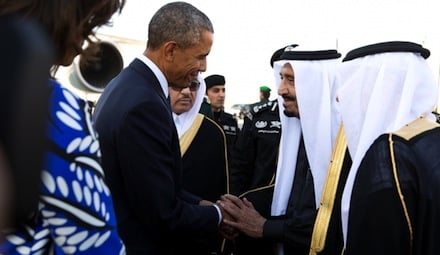The US-backed Saudi military intervention in Yemen is entering a dangerous phase. Clearly, the Saudi air attacks, guided by US intelligence and logistics support, have not had any worthwhile impact so far on the Houthi campaign to seize control of southern Yemeni port city of Aden. But it is Pakistan that may have dealt a lethal blow to the US-Saudi campaign today.
The country’s parliament has unanimously called for Pakistan staying neutral in the Yemen conflict except in the highly improbable eventuality of Saudi Arabia’s territorial integrity being violated. In operative terms, this means that Pakistan will not join any ground attacks on Yemen. Which in turn means that the Saudi intervention will be severely cramped, since military experts and analysts doubt the efficacy of the Saudis achieving any worthwhile results through the air attacks alone.
Without Pakistan, the much-touted Saudi “coalition” becomes a macabre joke. Read a Guardian report, here, on the actual composition of the Saudis’ so-called coalition. It is out of the question that Egypt’s Field marshal Abdel Fatah Al-Sissi has forgotten that Egypt under Nasser once burnt its fingers very badly in Yemen.
To be sure, Iran will continue to pile up pressure on Saudi Arabia. The Supreme Leader Al Khamenei used exceptionally harsh language to condemn the Saudi intervention in Yemen, calling it “genocide”. Of course, a direct Iranian intervention in Yemen is to be ruled out. Iran never resorts to military adventurism. (Read my blog Yemen: Iran’s diplomacy shifts gear.)
In any case, it suits Iran to have the Saudi leadership stew slowly and steadily in the boiling Yemeni cauldron. The Houthis can be trusted to rub the Saudi nose in the dust, as Khamenei forewarned. Tehran would estimate that a debacle in Yemen would aggravate the power struggle within the House of Saud and reforms of the country’s archaic power structure may become unavoidable, especially the empowerment of the suppressed Shi’ite communities in the eastern provinces bordering Yemen.
All this puts the Obama administration in a fix — the US may have to own this war as its own war in a very near future. The only good thing for Washington so far has been that the Saudis are fast depleting their military stockpile and a hefty multi-billion order for more purchase of American weaponry is surely on the cards. That would, in Obama’s reckoning, create many more new jobs in the US economy.
Bit it is a gloomy scenario otherwise. The US was hoping against hope that Pakistan would play its traditional role as the coolie carrying the load of the US regional strategies. Now, the US is left with no alternative but to play a more direct interventionist role to salvage the prestige of its key ally, the House of Saud.
But it is doubtful if Obama will start a war in Yemen involving American forces. The smart thing would have been to lead the Saudi war from behind and to capitalize on it politically.
Equally, by now there is a much better awareness that this not really a Sunni-Shi’ite conflict but an issue of fratricidal strife over political empowerment. The Houthis are Zaydi Shi’ites but that religion is doctrinally closer to Sunni Islam. What is unfolding in Yemen is the inevitable debris out of the abortive Arab Spring four years ago.
The US and Saudi Arabia are paying a heavy price for manipulating the democratic transformation in Yemen and for their misguided enterprise to put a new puppet in power in place of the discredited Saudi-backed old puppet Mohammed Saleh.
All in all, Yemen conflict is escalating into a first-rate regional crisis for the Obama administration. The best thing will be to initiate a U.N. Security Council-led mediation. Obama should discuss the Yemen issue with his counterparts in the U.N. Security Council and try to build a consensus. Time is of the essence of the matter, especially since the al-Qaeda is waiting in the wings.
After all that has happened, it is virtually impossible to install another US-Saudi puppet in power in Sana’a. An inclusive power-sharing arrangement that accommodates the Houthis now becomes unavoidable if there is to be durable peace. It will not be a bad thing to happen, either, given the deep-rooted tribal politics in the country.
With civilian casualties mounting by the day, Yemen may soon be riding a wave of anti-Saudi popular sentiment. And this could turn out to be the Saudi regime’s Vietnam. Read an excellent commentary in the Foreign Policy magazine.
Reprinted from Indian Punchline.



